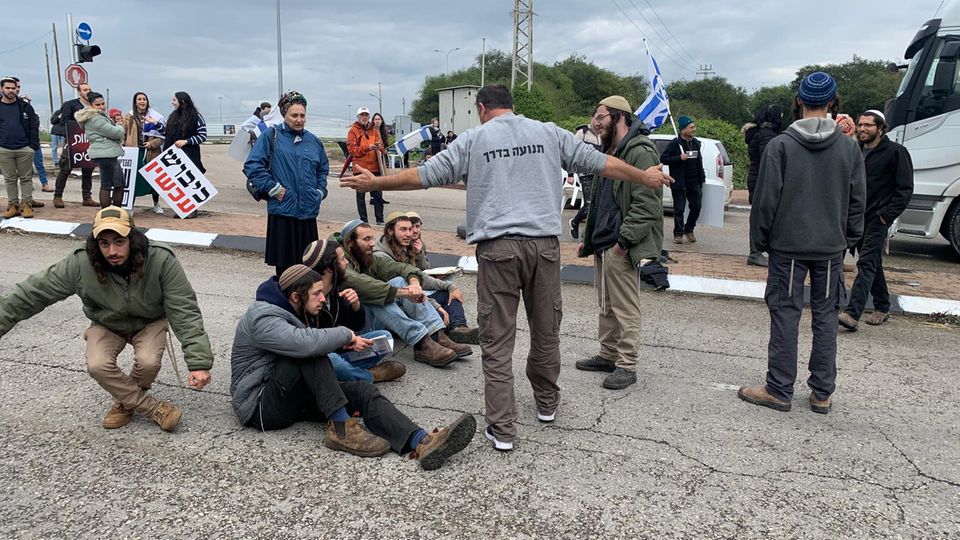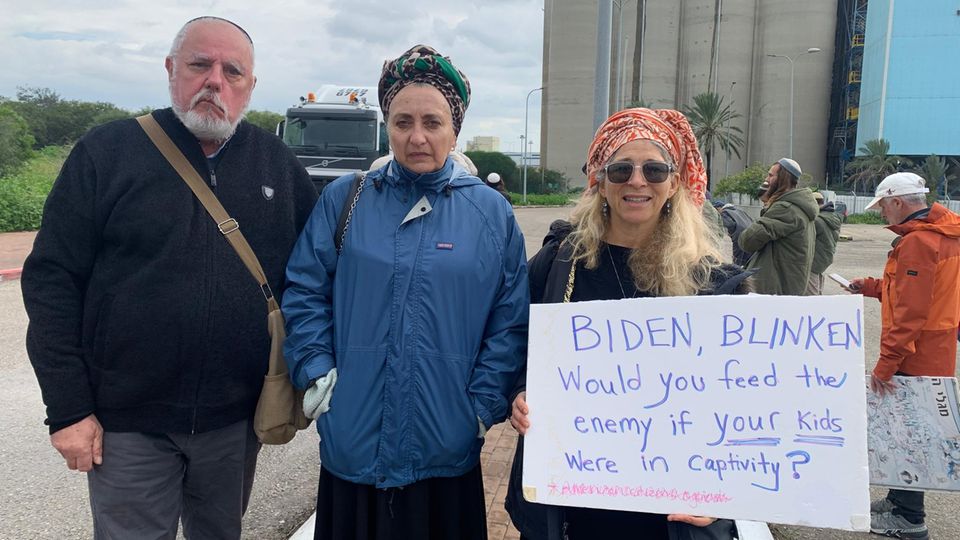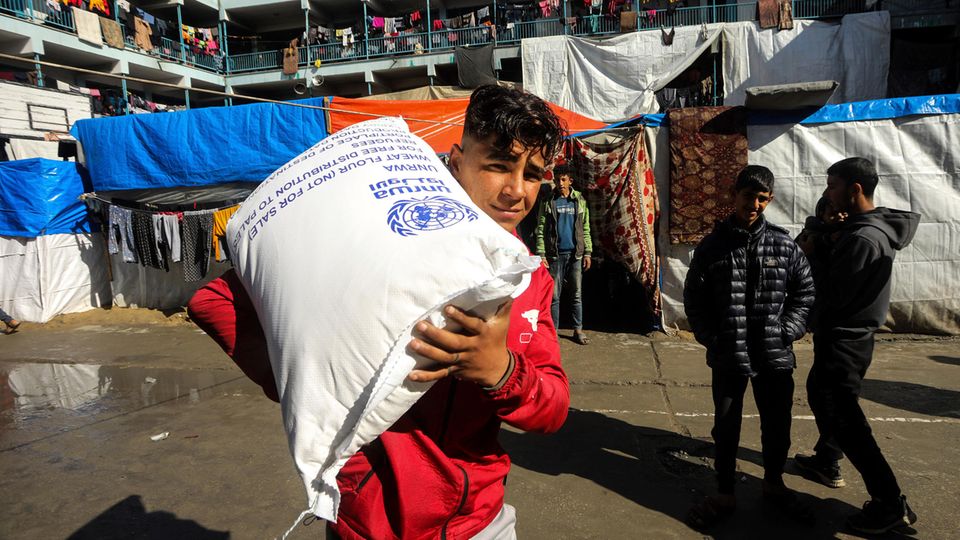On site
Blockade at Ashdod port
No more vices to Gaza? What the blockade of aid deliveries says about the mood in Israel
People block truck deliveries to Gaza at the port of the Israeli city of Ashdod
© Katharina Kunert
After the revelations about possible Hamas helpers among the employees of the UN refugee agency for the Palestinians, the debate in Israel is coming to a head. The majority of people reject humanitarian aid to Gaza — and some even block trucks. Our reporter was there.
Three truck drivers honk at the same time, some of the demonstrators cover their ears. But they stay on the street. At the port of the Israeli city of Ashdod they are blocking the aid deliveries that are supposed to be sent to Gaza should. This goes on all day long until the truck drivers’ shift is finally over in the afternoon. Honking doesn’t drive them away. Two young men even make a game out of it. They dance around a plastic chair until the noise briefly stops. Then they both try to sit on the chair first: travel to Jerusalem to prevent the truck trip to Gaza.

A truck driver insults the young men in the port of Ashdod. Most of them belong to religious-nationalist settler groups
© Katharina Kunert
Hamas benefits from the aid, they say
There are only about 40 people trying to block roads in the huge port area, sometimes even opening the tarpaulins to see what is hidden underneath. But they manage to stop the operation. And they film everything and want to use their images to send a message to other Israelis: Come here too so that the enemy in the Gaza Strip doesn’t get any help.
Why are they doing all this? They say this quite openly: The main thing that benefits from the deliveries Hamas. They accept that without the deliveries the civilian population will continue to be in need, without water, food and fuel. “It is absurd to provide aid to the enemy while they are still holding the hostages in Gaza,” says a young woman. Her husband’s brother is Elyakim Libman, one of the Israelis kidnapped by Hamas. “The food is included “Not to the hostages anyway, we have no illusions about that.”
The young woman does not want her name published. But she says that her family lives in Har Bracha. This is an illegal Jewish settlement in the West Bank, near the city of Nablus. Almost all of the demonstrators at the harbor belong to the national-religious settlers. A radical minority, but a pretty loud one, also when it comes to the war in Gaza. They don’t want any help for civilians, some are demanding with signs: “Occupy now.” Some even want to build new settlements in the Gaza Strip – as happened before the Israeli army withdrew in 2005.
It is not the only motive that can be recognized in conversations. There are also those who want to prevent any help for Gaza out of personal pain. For example, the mother whose 22-year-old son was shot as a soldier in Gaza. She says: “I want my son not to die in vain. Israel should not provide for those who are responsible for his death.”
A few days ago, demonstrators blocked aid deliveries at the Kerem Shalom crossing into the Gaza Strip. The army then declared the area a military exclusion zone. They then planned the port blockade in Ashdod in WhatsApp groups.

Muriel Franco (center) is the mother of a 22-year-old soldier who was shot dead by Hamas supporters during the war in Gaza. She fears that the deliveries will primarily help the terrorist group
© Katharina Kunert
Many Israelis reject aid deliveries
Even if the local response remained modest: a survey by Israel’s largest TV station, Channel 12, shows: 72 percent of those surveyed are in favor of stopping humanitarian aid to the Gaza Strip until all of the remaining 136 hostages have been freed.
The US government led by President Joe Biden and Secretary of State Antony Blinken is urging Israel to allow aid to the Gaza Strip and to continue doing so despite the protests. This is also why the signs at the port blockade include sentences like: “Biden, Blinken – would you feed the enemy if your children were in captivity?”
Since the revelations about the UN relief agency for Palestinians UNRWA, more and more voices in Israel are now calling for its closure. According to Hamas intelligence information, twelve employees are said to have actively helped in the kidnappings and massacres on October 7th in Israel. Around ten percent of the total employees are said to have contact with the group, which is classified as a terrorist organization. The two largest donors, the USA and Germany, have stopped payments for the time being. UNRWA chief Philippe Lazzarini then warned: “If funding continues to be suspended, we will most likely be forced to suspend our operations by the end of February, not only in Gaza but in the entire region.”
Not all donors want to go that far. Norway, Spain, Ireland and Belgium, for example, have announced that they will continue to finance UNRWA, but the allegations need to be clarified. The humanitarian consequences for innocent people are too serious.
The question arises: What would be the alternative to UNRWA? Which aid organizations could look after schools, health centers and shelters for Palestinians on a similar scale and provide them with water and food in the chaos of war? In Israel, some voices are now calling for other organizations to take over the aid – such as the UNHCR, which is responsible for refugee aid worldwide.
Empathy for the suffering of the other side is low. There are no images of the desperate people in the Gaza Strip shown on Israeli television. There is little mention in the Arab media about the exhausted Israeli families of those killed and abducted. In times of war, many people on both sides are blind to the suffering of others.



